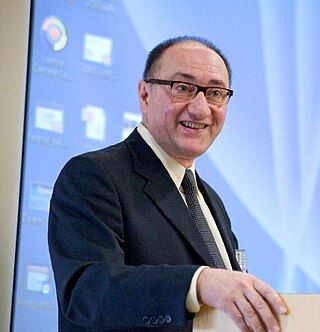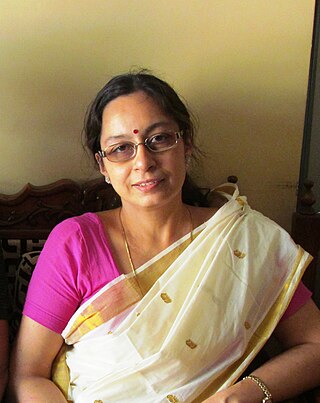Ubiquitous computing is a concept in software engineering, hardware engineering and computer science where computing is made to appear anytime and everywhere. In contrast to desktop computing, ubiquitous computing can occur using any device, in any location, and in any format. A user interacts with the computer, which can exist in many different forms, including laptop computers, tablets, smart phones and terminals in everyday objects such as a refrigerator or a pair of glasses. The underlying technologies to support ubiquitous computing include Internet, advanced middleware, operating system, mobile code, sensors, microprocessors, new I/O and user interfaces, computer networks, mobile protocols, location and positioning, and new materials.
Context awareness refers, in information and communication technologies, to a capability to take into account the situation of entities, which may be users or devices, but are not limited to those. Location is only the most obvious element of this situation. Narrowly defined for mobile devices, context awareness does thus generalize location awareness. Whereas location may determine how certain processes around a contributing device operate, context may be applied more flexibly with mobile users, especially with users of smart phones. Context awareness originated as a term from ubiquitous computing or as so-called pervasive computing which sought to deal with linking changes in the environment with computer systems, which are otherwise static. The term has also been applied to business theory in relation to contextual application design and business process management issues.
Wireless sensor networks (WSNs) refer to networks of spatially dispersed and dedicated sensors that monitor and record the physical conditions of the environment and forward the collected data to a central location. WSNs can measure environmental conditions such as temperature, sound, pollution levels, humidity and wind.

Smart environments link computers and other smart devices to everyday settings and tasks. Smart environments include smart homes, smart cities, and smart manufacturing.

Kaveh Pahlavan, is a Professor of Electrical and Computer Engineering and Computer Science and the director of the Center for Wireless Information Network Studies (CWINS), Worcester Polytechnic Institute, Worcester, Massachusetts. Pahlavan started doing research on Wi-Fi when it was in its infancy, and has worked on wireless indoor geolocation, and Body Area Networking.
Anind Dey is a computer scientist. He is the Dean of the University of Washington Information School. Dey is formerly the director of the Human-Computer Interaction Institute at Carnegie Mellon University. His research interests lie at the intersection of human–computer interaction and ubiquitous computing, focusing on how to make novel technologies more usable and useful. In particular, he builds tools that make it easier to build useful ubiquitous computing applications and supporting end users in controlling their ubiquitous computing systems.
Cyber–Physical System (CPS) are integrations of computation with physical processes. In cyber–physical systems, physical and software components are deeply intertwined, able to operate on different spatial and temporal scales, exhibit multiple and distinct behavioral modalities, and interact with each other in ways that change with context. CPS involves transdisciplinary approaches, merging theory of cybernetics, mechatronics, design and process science. The process control is often referred to as embedded systems. In embedded systems, the emphasis tends to be more on the computational elements, and less on an intense link between the computational and physical elements. CPS is also similar to the Internet of Things (IoT), sharing the same basic architecture; nevertheless, CPS presents a higher combination and coordination between physical and computational elements.
Ivan Stojmenović was a Serbian-Canadian mathematician and computer scientist well known for his contributions to communications networks and algorithms. He has published over 300 articles in his field and edited four handbooks in the area of wireless sensor networks.
Min Chen is a professor in the School of Computer Science and Technology at Huazhong University of Science and Technology (HUST). His research focuses on Big data, Internet of Things, Machine to Machine Communications, Body Area Networks, Body Sensor Networks, E-healthcare, Mobile Cloud Computing, Cloud-Assisted Mobile Computing, Ubiquitous Network and Services, Mobile Agent, and Multimedia Transmission over Wireless Network, etc. He has been an IEEE Senior Member since 2009.
The Telecooperation Office (TECO) is a research group at the Karlsruhe Institute of Technology in Karlsruhe, Germany. The research group is in the Institute of Telematics, and is attached to the chair for Pervasive Computing Systems, currently held by Michael Beigl.
Albrecht Schmidt is a computer scientist best known for his work in ubiquitous computing, pervasive computing, and the tangible user interface. He is a professor at Ludwig Maximilian University of Munich where he joined the faculty in 2017.

Chai Keong Toh is a Singaporean computer scientist, engineer, industry director, former VP/CTO and university professor. He is currently a Senior Fellow at the University of California Berkeley, USA. He was formerly Assistant Chief Executive of Infocomm Development Authority (IDA) Singapore. He has performed research on wireless ad hoc networks, mobile computing, Internet Protocols, and multimedia for over two decades. Toh's current research is focused on Internet-of-Things (IoT), architectures, platforms, and applications behind the development of smart cities.

Nandini Mukherjee is an Indian computer scientist. She is a professor of department of computer science and engineering of Jadavpur University, Kolkata, India.
Urban informatics refers to the study of people creating, applying and using information and communication technology and data in the context of cities and urban environments. It sits at the conjunction of urban science, geomatics, and informatics, with an ultimate goal of creating more smart and sustainable cities. Various definitions are available, some provided in the Definitions section.
Zhiha He (何志海) from the University of Missouri in Columbia, Missouri was named Fellow of the Institute of Electrical and Electronics Engineers (IEEE) in 2015 for contributions to video communication and visual sensing technologies.

Atta ur Rehman Khan is a computer scientist and academician who has contributed to multiple domains of the field. According to a Stanford University report, he is among World's Top 2% Scientists. He is the founder of National Cyber Crime Forensics Lab Pakistan, which operates in partnership with NR3C. He has published numerous research articles and books. He is a senior member of IEEE and ACM.

Moustafa Youssef is an Egyptian computer scientist who was named Fellow of the Institute of Electrical and Electronics Engineers (IEEE) in 2019 for contributions to wireless location tracking technologies and a Fellow of the Association for Computing Machinery (ACM) in 2019 for contributions to location tracking algorithms. He is the first and only ACM Fellow in the Middle East and Africa.
J. J. Garcia-Luna-Aceves is a Mexican-American computer engineer, currently professor at the University of Toronto's Department of Electrical and Computer Engineering. Until 2023, he was the Distinguished Professor of Computer Science and Engineering at University of California at Santa Cruz UCSC, holding the Jack Baskin Endowed Chair of Computer Engineering, is CITRIS Campus Director for UCSC, and was a Principal Scientist at the Xerox Palo Alto Research Center. He is a Fellow of the IEEE for contributions to theory and design of communication protocols for network routing and channel access and a fellow to AAAS.
Diane Joyce Cook is an American computer scientist whose research interests include artificial intelligence, data mining, machine learning, home automation, and smart environments. She is Regents Professor and Huie-Rogers Chair Professor of Electrical Engineering and Computer Science at Washington State University.
Giancarlo Fortino is an Italian computer scientist who is currently a full professor of computer engineering at the Department of Informatics, Modeling, Electronics and Systems (DIMES) of the University of Calabria.






